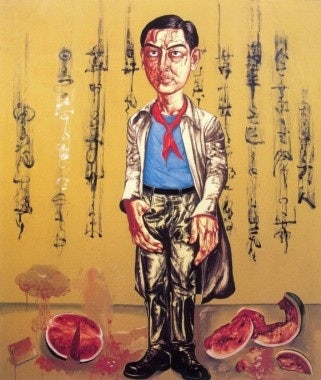Inflation, Few Investment Options Make Collecting Art Highly Attractive To Wealthy Chinese#

Hong Kong is now one of the world's top markets for Chinese art, antiques, and jewelry, rivaling New York and London
MarketWatch writes this week on a topic regularly covered by Jing Daily: the "new Chinese collectors" who have made domestic Chinese auction houses some of the most profitable in the world while playing an instrumental role in Hong Kong's ascendancy as a key wine and contemporary art auction market. As a result of few alternative investment options, stock market instability, fears about inflation, and a rising yuan, the presence of Chinese collectors at auction, not only in mainland China or Hong Kong but also in New York and London, has risen quickly on a global level. With Chinese collectors only really hitting the world auction market around 2006, and not truly flexing their muscles until 2009, they're simultaneously the auction world's new hope and a force to be reckoned with.
Interestingly, as MarketWatch notes, the emergence of new Chinese collectors has come at a time when Europe's much more mature collector base has cut back. This shift in entrenched auction dynamics, though new, is already causing important shockwaves in the contemporary art, fine wine, antiques and luxury watch auction segments. From the article:
As China’s slice of the international market has grown steadily, Europe’s has declined. As a whole, the development of Asia’s art trade poses a real threat to Europe, where taxes are rising along with a perception that it’s a tough place to do business.
“The same thing happened to Paris, the center of the art trade in the 1950s. The taxes and regulations became just too onerous on buyers and sellers,” according to economist Dr. Clare McAndrew, founder of Arts Economics. “The whole market shifted from Paris to the U.S. and the U.K.“
Sales already are drifting east. The value of China’s art market — which includes mainland China, Hong Kong, Macau and Taiwan — has more than doubled since 2009.
With the number of new millionaires and billionaires being created in China increasing faster than in developed economies like the U.S. -- Forbes identified 115 billionaires in China in its latest tally -- more cash-flush Chinese see the auction market purely as an investment vehicle. As Anthony Lin, former chairman of Christie’s Asia, said, "In China, they don’t have open money markets or commodity markets. For the amount of wealth that has been generated, there’s not many options for investment. The art market is one of the few areas where there is quite a strong investment position being taken."
While this sort of art investment, focused on short-term gain rather than long-term appreciation, is looked upon with disdain by many established collectors, in China what's happening is that the speculators (who generally buy most of their art at domestic Chinese auction houses) are being naturally differentiated by the longer-term collectors, who focus more on buying works by "blue-chip" Chinese artists, particularly in Hong Kong. Essentially, this is creating something of a two-tiered auction market, as identified by ArtTactic's recent survey on the health of the contemporary Chinese art market. What this means is that global auction houses that operate in Hong Kong, Sotheby's and Christie's in particular, see China's more motivated collectors as some of their most loyal and lucrative customers. As Sotheby’s 2010 annual report clearly stated, “Among new collectors competing at the highest levels of our global sales, those from greater China dramatically outnumbered those from North America or the United Kingdom by 50%.”
While MarketWatch points out that issues remain in the Chinese auction market, from allegations of price manipulation at domestic Chinese auction houses to rampant counterfeiting, the article notes that the incongruities seen at auctions within mainland China are widely contained there. As an older auction market, populated by global auction houses, Hong Kong has been generally insulated from the problems that plague domestic mainland Chinese auction houses. Concluding by asking if China's gain will be Europe's loss, the article suggests that China may indeed become a true auction rival to Europe if China's auction sector inefficiencies and inadequate dealer network work themselves out:
A concern for Europe — where sales have been slow to pick up from 2009 and remain sluggish — is that as China strengthens, more buyers will choose to invest via Asia as a cheaper, easier alternative.
“There’s a perception that Europe is becoming a very expensive, covered in red-tape, place to do business. People will do business elsewhere if they can,” according to McAndrew. “Europe lost some of the higher-priced contemporary sales to the U.S. because it was just a cheaper place to do business. That is going to happen toward China eventually.”